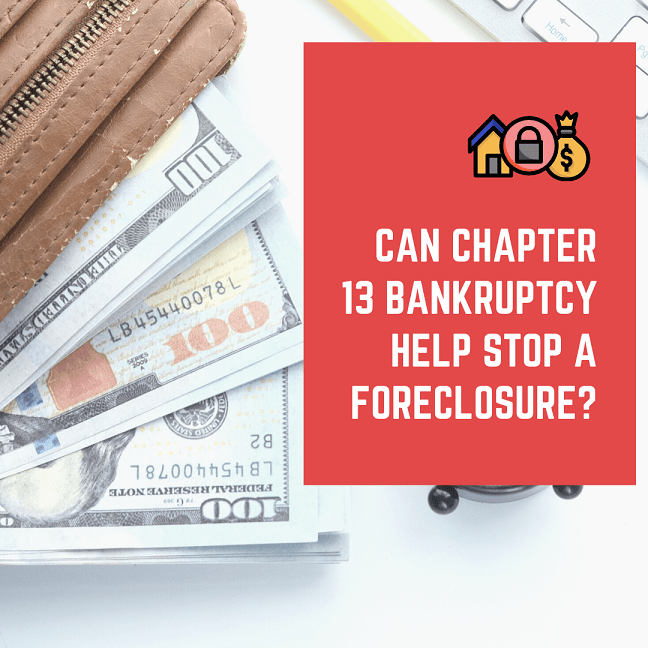
Receiving a notice of foreclosure is one of the scariest situations a homeowner can face. Fortunately, there are programs out there to help people who have fallen on hard times keep their homes and other property, even if they are behind on payments.
What is Foreclosure?
Your home may enter the foreclosure process if you have missed a certain amount of your monthly payments. Foreclosure is a legal process your creditors can utilize in an attempt to recoup your unpaid debts. After you’ve missed a certain number of payments, your creditors have the right to begin the process of selling your property (including your home) to recover their losses.
Can Chapter 13 Protect Your Home From Foreclosure?
If you’ve fallen on hard times and are at risk of losing your home due to foreclosure, don’t panic. Filing Chapter 13 bankruptcy is a way to immediately halt the foreclosure process and force a lender to work with you to create a plan that allows you to pay back what you owe over time – typically within 3-5 years. During this period, lenders are legally prohibited from starting collections efforts against you.
Chapter 13 is also known as a “debt restructuring” as it allows you to reorganize your mortgage loan’s original terms into a manageable payment plan for you. This differs from Chapter 7 bankruptcy which involves liquidating your assets, including your home, to pay off your debts. Chapter 13 bankruptcy was created as an alternative to help people hold onto their homes – as long as they can keep up with the new payment plan agreed upon under Chapter 13.
Are You Eligible to Apply for Chapter 13 Bankruptcy?
There are specific eligibility requirements to file for Chapter 13 bankruptcy which includes the following:
- You must be employed and have adequate income to cover your new required monthly payments under the plan- this is why Chapter 13 is also known as a wage earner’s plan.
- The amount of your debt has to be under certain thresholds, which vary from year to year. In 2020, for example, you couldn’t have more than $419,275 in unsecured debt and $1,257,850 in secured debt to apply for Chapter 13.
- You can’t be behind on filing your taxes- to file for Chapter 13, you will need to prove that you have filed your tax returns for the previous four years.
- You have to be filing as an individual (businesses aren’t able to file Chapter 13).
- You can’t have filed for Chapter 13 in the previous two years or Chapter 7 in the last four years.
How Can You File for Chapter 13 Bankruptcy?
When considering filing for Chapter 13, it’s essential to seek professional help from a nonprofit credit counseling agency as well as from a qualified bankruptcy attorney. You should be able to walk away from these consultations with a better understanding of your circumstances and the best way to move forward.
Once you meet with the credit counseling agency and your attorney, it’s time to fill out the paperwork (your lawyer will help with this) and submit your bankruptcy petition to the courts. As soon as your petition is filed, an “automatic stay” occurs, which means that your lenders must immediately cease trying to collect on your debts.
Additional Considerations
Though filing Chapter 13 certainly has its advantages, there are some significant drawbacks to consider. Let’s take a closer look at the benefits and potential downsides so you can make the best decision for your specific situation.
Benefits of Chapter 13 Bankruptcy
- Allows you to keep your property, such as your home and car.
- It offers more flexible repayment options, and you may end up paying less on your debts overall.
- Allows a reorganization of your debts so you can get caught up on any overdue payments and create a payment plan that suits your budget.
Potential Drawbacks of Filing Chapter 13
- Once the new payment plan is created under Chapter 13, you must make on-time payments for the next 3-5 years or risk cancellation of the program.
- Filing for Chapter 13 stays on your credit report for up to seven years and may hinder your ability to get approved for loans in the future.
- You can’t file for Chapter 7 bankruptcy until six years have passed since filing Chapter 13.
The Bottom Line
It’s important to remember that there are options available to you if your home is in foreclosure. Though filing for Chapter 13 has a few drawbacks, it might be your best option and the one that allows you to stay in your home even if you’ve missed several payments.
Let Us Help
We know how stressful facing foreclosure on a house can be. You don’t have to go through it alone. We’ve helped many homeowners in the same situation and are happy to help walk you through your options so you can feel more in control.
We’re standing by to help homeowners like you navigate this difficult time. Please contact us by clicking here or give us a call or text us at 781-309-7085.
